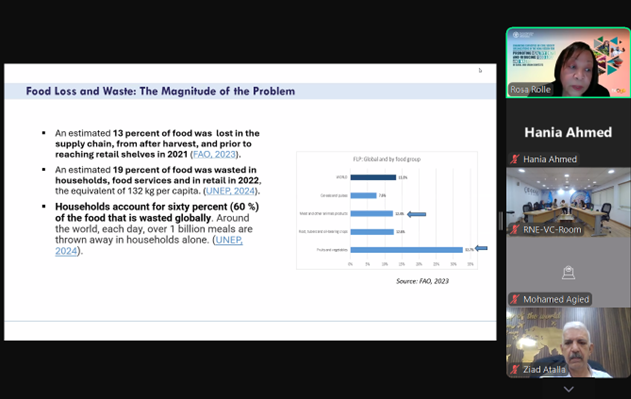Enhancing CSOs capacities to reduce food loss and waste and promote healthy diets in the NENA region

©FAO
As the Food and Agriculture Organization of the United Nations (FAO) celebrates its 80th anniversary, it remains steadfast in its commitment to addressing global food challenges. In the Near East and North Africa (NENA) region, food security and nutrition continue to be major concerns due to climate change, urbanization and socio-economic factors. To tackle these pressing issues, the FAO Regional Office for the Near East and North Africa (RNE) recently organized a two-day workshop to strengthen the capacities of Civil Society Organizations (CSOs) in addressing food loss and waste (FLW) and promoting healthy diets.
Addressing food loss and waste in the NENA region
The first day of the workshop, held on 19 March 2025, focused on the urgent issue of FLW in the region. Studies indicate that approximately 13 percent of global food production - valued at up to USD 400 billion - is lost between harvest and before the retail stage. Once food reaches the retail, food service, and consumption stages, an estimated 19 percent is wasted, the equivalent of 132 kg per capita with households accounting for 60 percent of the food that is wasted globally. In fact, round the world, each day, over 1 billion meals are thrown away in households alone. These losses not only threaten food security but also contribute to environmental degradation, including greenhouse gas emissions and biodiversity loss.
Speaking on the importance of addressing food waste, Rosa Rolle, Senior Enterprise Development Officer at FAO, has highlighted the global perspectives on FLW reduction, and she emphasized, "One of the major underlying causes of the high levels of food losses that we face is the fact that we apply a linear approach to how we operate in our food systems, which is a take, make, use, and dispose system. We need to shift to more circular food systems where we work to reduce, reuse and recover as much as possible".
FAO’s ongoing initiatives to combat FLW were also discussed, including the Guidelines for Action on Food Loss and Waste Reduction.
Participants highlighted the need for better stakeholder engagement, particularly between governments, private sector actors and civil society, to create systemic change. Rolle further noted, "By reducing food loss and waste, we can promote efficient resources use, contribute to economic growth, and foster more equitable distribution of food resources globally. This is critical for improving food security".
Promoting healthy diets for improved nutrition
On 20 March 2025, the workshop shifted focus to promoting healthy diets as a strategy to combat malnutrition and diet-related diseases in the NENA region. The region faces a triple burden of malnutrition: undernutrition, micronutrient deficiencies and rising obesity rates, largely due to changing food consumption patterns and urbanization.
FAO experts presented alarming statistics on malnutrition, with Fatima Hachem, Senior Nutrition Officer at FAO, stating, "more than 3 billion people worldwide lack access to nutritious foods. By 2030, nearly 600 million people worldwide are projected to be chronically undernourished". She highlighted the importance of sustainable healthy diets that are not only nutritious but also culturally acceptable and environmentally friendly.
Hachem also addressed FAO and World Health Organization’s 2024 guidelines on healthy diets, explaining that "healthy diets are characterized by adequacy, balance, diversity and moderation. The food system must be capable of delivering nutritious foods that are affordable, acceptable and adapted to local cultures". She underscored the role of CSOs in advocating for better policies, promoting nutrition education, and supporting local food systems to ensure access to affordable and nutritious food.
Strengthening FAO-CSO collaboration and call to action
Moustapha Mohamed, Food Safety and Quality Officer at FAO RNE, emphasized FAO’s commitment to supporting CSOs in promoting nutritious food and healthy diets in both rural and urban settings, through capacity-building programmes, technical assistance and policy guidance. He stressed the need for collaboration, stating, "together, we can collaborate, innovate and advocate for a future where everyone has access to safe, nutritious and sustainable food".
This two-day workshop concluded with a call to action for CSOs to take a proactive role in reducing FLW and promoting healthy diets. By strengthening collaboration among FAO, governments and CSOs, the NENA region can move closer to achieving Sustainable Development Goal (SDG) 12.3 (reducing food loss and waste) and SDG 2 (zero hunger). Through continued engagement and innovative solutions, CSOs can play a pivotal role in transforming agrifood systems for a more sustainable and food-secure future.
